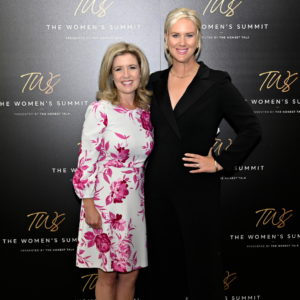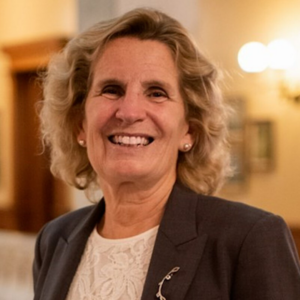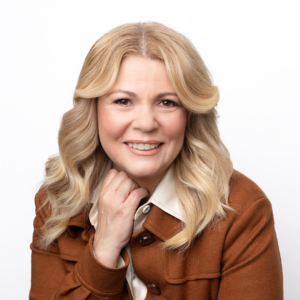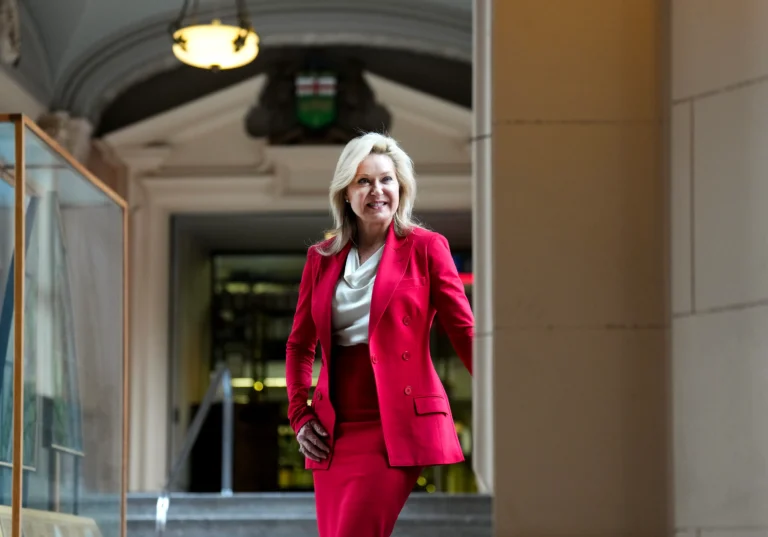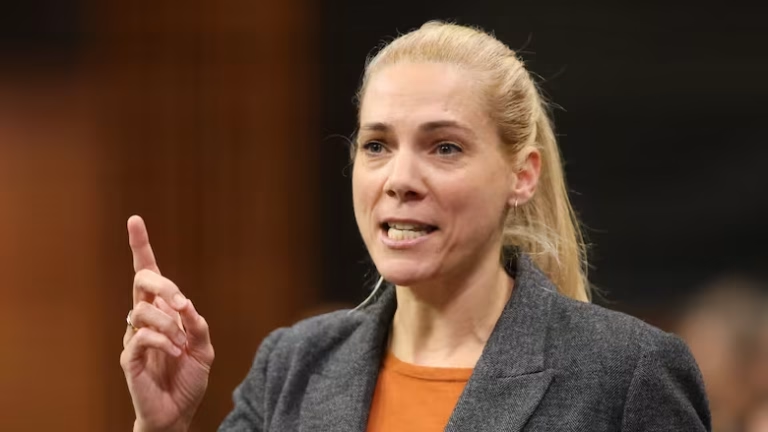Lisa Raitt – Political trailblazer, corporate leader and advocate for dementia research
Lisa Raitt is a former federal cabinet minister and Deputy Leader of the Official Opposition and current Vice Chair and Managing Director of Global Investment Banking at CIBC.
She speaks candidly with The Honest Talk about her upbringing, her influencers, her political career, and her family life. The mother, wife, and Cape Breton native openly shares stories about the professional obstacles she has faced and the personal challenges she continues to encounter.
Her no-regrets attitude is refreshing and something we can all learn from.

Taking opportunities as they come
Catherine Clark: Is this the path you imagined for yourself when you were a little girl growing up in Cape Breton?
Lisa Raitt: No. I’m breaking the first rule that everyone’s supposed to have, which is have a plan. My only plan was that I was going to get an education and from there I would get a job and look after my family. And that’s really the only parameters that were put upon me when I was growing up. So, I went from academics to whatever was shaping me from the outside.
As an example, after I finished my Master’s in Chemistry, I realized I’m a terrible chemist. The only other experience I had was working at a Dairy Queen, so I wrote the LSAT and the MCAT and decided I would do whatever I was better at.
Jennifer Stewart: You were one of seven kids and you learned as a teenager that there was a twist to that story. Are you comfortable talking about that?
Lisa Raitt: Of course. Imagine that you are 11 years old and the person you thought was your father passes away, and a few weeks later you’re told that your parents are actually your grandparents and your mother is who you thought was your sister. Of all the sisters I was close to, she was not one. As I look back, I can understand it. It must have been such a cross for her to bear.
Catherine Clark: Did you feel any bitterness about it? That it had been kept from you?
Lisa Raitt: I was never bitter. I viewed it more along the lines of being an interested bystander. I feel so bad for Delores, my mother, that she had to go through this when she was 20 years old. I approached it more from a place of curiosity.
Jennifer Stewart: Who were your inspirations, both in your community and in the wider world around you?
Lisa Raitt: First of all, the Congregation of Notre Dame, the group of religious sisters who lived in Cape Breton, educated a lot of us who are now 50 years of age and up. They had huge impacts on shaping the girls who came through their schools.
In my age group, the nuns had decided that science was the way that these girls were going to do very well for themselves. So I was trained into science from an early age, and the first woman I remember thinking was remarkable was Marie Curie. Because of that I naturally gravitated to seeing women in leadership positions. We didn’t need to have men as our role models — women were just as good. The nuns were really sharp and empowered.
Getting more women into politics
Jennifer Stewart: Looking at your career in government which is absolutely remarkable — you’ve created a path for so many women. Would you do it again? And what can we do to get more women into politics and take the nastiness out of it that deters so many from stepping up to the plate?
Lisa Raitt: I would absolutely do it again, even with all of the bad things that happened. I don’t want a sanitized version of my career. There were some lows, some highs, and all of that has made me the person I am today, and for that I am grateful. As for social media, don’t be so worried about likes. If you ignore Twitter, it really does go away.
Catherine Clark: You use social media really effectively. What is it about something like Twitter that attracts you?
Lisa Raitt: I use Twitter mostly as a place to cultivate and curate what I want to hear in terms of what’s happening in news. I follow all kinds of folks, not just the echo chamber of conservative thought. I don’t engage as much as I used to, and I don’t engage as much on political partisan issues, but I do think it’s an important way to communicate with folks. It has a place if you agree not to be angry about it and it’s certainly the place for fast-breaking news. I find it entertaining and the minute I don’t find it entertaining, I’m gone.
Jennifer Stewart: You said you’re not quite done with politics, and there are a lot of people who wish you were still in politics today. What are your political ambitions?
Lisa Raitt: I think I’m always going to be a partisan. Whether or not I’m always going to be a politician is something for the future. Talking about social media, I lost in the last election to Adam van Koeverden who has a significant social media presence and he utilized that as more of an advertising campaign that about the issues. So, a good lesson — you may not like it but it certainly has to be part of any communications strategy if you want to engage the public.
I am not on a path to return to politics any time soon. I am enjoying having a weekend again, and I am keen on enjoying the moment. As you know, my husband has early-onset Alzheimer’s and right now, I’m not thinking about how do I get back to politics. I’ve always been able to take advantage of opportunities that arise. If there’s a path, I’ll be ready for it but I’m not plotting or planning it.
Catherine Clark: Can I ask you about that idea of a path? A lot of women feel that they need to have some kind of a plan and stick to it, which can induce a lot of guilt, anxiety, and stress. Do you think people should have a plan?
Lisa Raitt: I believe people should have a foundation that is going to allow them to make decisions. My 20s was all about getting my education and training. That was planned. But I never said, “I’d like to be the CEO of the Toronto Port Authority.” I didn’t even know what it was. I was fired from my job as a first-year lawyer because I wasn’t good at what I was doing, it was not a good fit.
I was going away to England and needed a summer job. I went to a temp agency, did a spelling test and a typing test, learned Excel, and went for an interview to be the secretary to the chair of the Toronto Harbour Commission. In 1998 I was the secretary, and in 2002 I became the CEO.
Being a caregiver and safety net
Jennifer Stewart: I really like your takeaways about humility and going through doors that are open to you. If 2020 has taught us anything, it’s that you can have the best-laid plans and things will go awry, and you have to take care of yourself. That segues into my next question. You mentioned that your husband, Bruce, has Alzheimer’s. How has that journey been?
Lisa Raitt: Bruce is at the point in his progression that when he sees his reflection, he thinks it’s a stranger. Some days they’re good friends and laugh with each other. Other days, like today, they fight. He tried to punch the mirror and I had to take it down. You don’t have to be sorry about it — people have to understand this is a terrible disease that’s happening in a lot of homes across Canada and we’ve got to cut each other slack.
You can’t recognize cognitive issues by looking at someone — but the assumption is people are being obtuse or rude because they don’t look like it. That’s why I talk about it up front. If Bruce’s employer hadn’t sent him for a medical assessment when his performance dropped, he wouldn’t have been diagnosed, he would have been fired, and wouldn’t have long-term disability. Compassion and understanding and taking a pause are all really important.
Catherine Clark: How do you take care of yourself, though?
Lisa Raitt: I don’t. I find it cathartic to talk about this stuff, but everyone else is more important at this time. But life isn’t bad, because I don’t feel stress about it. I don’t beat myself up by saying, “I need to find something to do to look after myself.” I just be. If I want to watch Master Chef Australia for an hour-an-a-half, I’m going to do that. I find those moments. It’s going to get tougher, and at some point it’s going to have to be about me.
Catherine Clark: I am struck by how grounded you are and how you have this approach to life which is ‘take it like it is, and let’s not be upset and angry about it, let’s just move on.’ It sounds like you’ve always been this way and it’s a remarkable personality trait. It’s an incredible element for your survival in a way.
Lisa Raitt: I am the safety net — for me, for my husband, for my family — and I feel the responsibility of that. I have God-given brains and I have to use them for the betterment of the entire ecosystem around me. It’s not just about me — my purpose is to support and I am there to help them in any way I can.
Jennifer Stewart: You’ve said work has been a salvation for you. When people are career-driven, it’s sometimes viewed as a bad thing. Is it still an outlet for you?
Lisa Raitt: I need that line from transitioning from wearing a suit to getting home and putting on soccer pants. I miss it right now with the pandemic. Sitting at my desk and then getting up to get a coffee seems like such a luxury. Work to me is a refuge, because I’m good at it and everybody wants to do something they are good at. When other parts of your life are falling apart, if you can find that thing that you’re good at and do it, that’s going to make you feel good. I loved being a politician, and I love what I’m doing now — it’s all the same kind of thing, advising people.
Know your value
Catherine Clark: When you talk about advising people in a professional capacity, a lot of women listening to this podcast are professional women who have gone through a lot of ups and downs in their careers as well. Do you have a takeaway that you’d like other women professionals to have?
Lisa Raitt: This is a piece of advice that was given to me by Caroline Mulroney. She advised me to buy this book by Mika Brzezinski called Knowing Your Value. I know what my value is, but I’m terrible at communicating it in a financial or fiscal way. I think a lot more professional women have to understand they’ve got to put their hand up and ask. They have to make the case for promotion, for extra money, for what you’re worth.
I don’t say “I’m grateful” or “I’m lucky” anymore. I worked and I’m taking the opportunities as they come up.
Lisa Raitt
My takeaway from the book is: I don’t say “I’m grateful” or “I’m lucky” anymore. I worked and I’m taking the opportunities as they come up and I’ve been prepared for it — luck is opportunity plus preparation. Stop demurring because we don’t think it’s a female thing to do.

